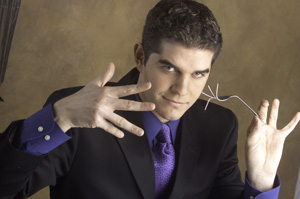
Mentalist EHUD SEGEV’s feats are extraordinary; just don’t call them magic tricks…
By Maureen Griffin
Perhaps you’ve heard about “The Mentalizer,” read about his mind- reading abilities, or seen pictures of him with his eyes fixed intently on a fork that he seemingly bends by the force of his will. Ehud Segev’s eerie show, Anomal, is definitely not first date material. But then, Segev openly admits, “This show is not for everyone.”
Anomal is a combination of perception, spirituality and magic, and his feats often are downright extraordinary. After a brief introduction, for example, the Mentalist Segev asks for a volunteer from the audience to hand over a credit card — which I personally supply. To my amazement, my MasterCard begins flying around his body. (I’m content if it causes twenties to fly out of a cash machine.)
Segev says he doesn’t like using playing cards when he performs because people think he merely does a trick. “It’s not,” he says. “I look into someone’s eyes or hold their hand, and I can tell what they’re thinking.” He illustrates the talent by naming the card an audience member is thinking about. But he insists he is not a mind-reader. “The only person I know who could read everything others were thinking is Mel Gibson in ‘What Women Want.’ That doesn’t exist,” he says.
But in one of the most extraordinary feats in the show, he points to a woman in the audience and says, “You have a song in your head,” She agrees. First he snaps out the tempo, and then he begins playing the song on the piano. If this isn’t mind-reading, I need a new dictionary.
I asked mentalist Segev how he bends flatware by merely looking at it. “It’s not telekinesis and it’s not telepathic. The energy is physical,” he insists. And he says that everyone has this innate power. “First you must connect to yourself and then you can connect to others. But most people do not know how to connect to themselves.”
however compelling his telepathic feats may appear, this is not what The Mentalist is about. Rather, he is a man with a message, and his extraordinary feats merely seem meant to get our attention. Indeed, even as a child, Segev says he knew he was different, or as he puts it, “weird.”
“When I was a kid, some girls asked me to do a séance. It didn’t work for them alone, and they felt I could do it. So, I met girls. I found out that being weird is good sometimes. The same things that make people run away from you in a certain time are the same things that will make people want to be close to you in another time, it’s like a magnet,” he explains.
Segev believes the ability to contact spirits resides in all of us. “I believe that what you contact is your own subconscious. I believe there is an ocean of souls that we all come from. When we die, we are put back into the ocean and re-emerge with a newly created soul. I don’t think there are old souls and new souls but that we are all one soul.
When the Mentalist Segev was 11, he says he had a dream that changed his life. He saw an old man running through a jungle. The farther into the jungle the man ran, the darker it became and the more pain he experienced. However, the man never turned back; he just kept running deeper into darkness, experiencing more and more pain, until eventually he died.
“I believe that good and evil exist within everyone, that God and the Devil are within us, and that the reason we were created this way is so we’ll always be prepared for anything We create light and dark energies. We live in a dark generation, so staying enlightened is harder now,” he adds.
In fact, the old man, he says, is a metaphor for our generation, which has gone down the wrong path — a painful, dark path — that it pursues despite the misery. “This is not their fault,” says Segev “We have been taught to think a certain way and to desire certain things by the media, our parents, teachers, and friends. The media has taken over our lives in a bad way and convinces us we should be someone else; someone we are not.
“In essence, we are taught to want money, fame, and power, to focus on material possessions, and to deny our own uniqueness. We therefore do not hear the small voice inside of us calling us to follow our own unique path, which will truly make us the happiest, most successful, and most fulfilled. Life shouldn’t hurt. When you’re following your own truth, things happen; they connect,” he says.
March 2006 ‘ The improper ‘ 33
 Mentalist Ehud Segev (The Mentalizer) New York City NYC Successful Mind
Mentalist Ehud Segev (The Mentalizer) New York City NYC Successful Mind





